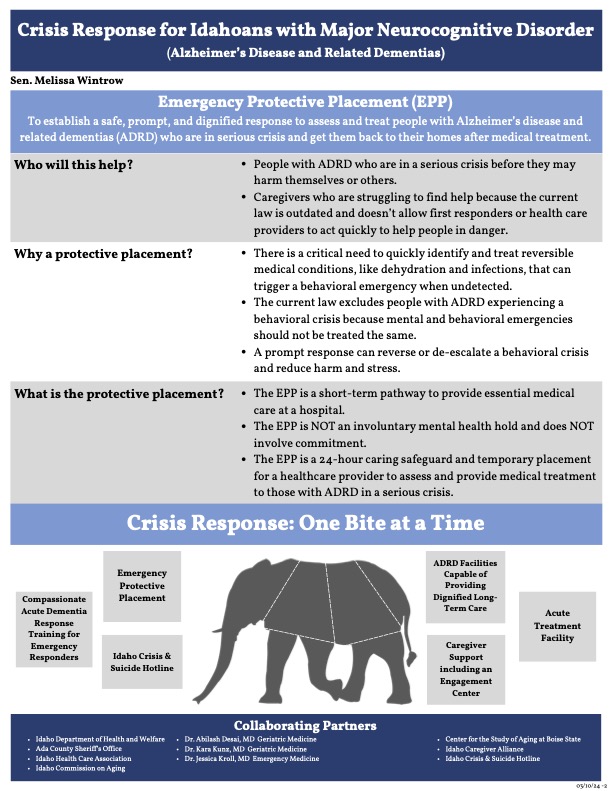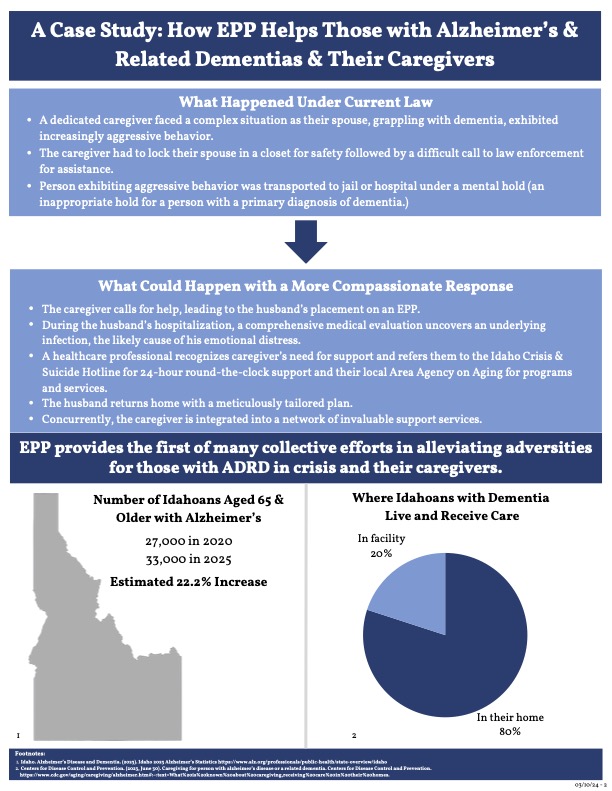CARE FOR PEOPLE WITH ALZHEIMER’S DISEASE and OTHER RELATED DEMENTIAS
What is ADRD = Alzheimer’s Disease and related dementias includes Alzheimer’s disease, Huntington’s disease, Parkinson’s, Lewy body dementia, Parkinson’s, and a few others defined in Idaho code.
I worked with a diverse group of caregivers, community leaders, and members of the medical community to solve a problem in our state where people with ADRD in serious crisis aren’t getting the help they need.
What does S1247a Do?
S1247a creates a temporary protective placement (24 hours) to get someone with ADRD to the hospital for medical treatment when they are in an serious crisis or a significant danger to harm themselves of others.
Why is it important to pass S1247a?
Right now, the only option for these vulnerable adults is jail or to be left in the dangerous situation. The current law does not address people with ADRD experiencing a behavioral crisis. We have a process to create a mental health hold for mental/behavioral health emergencies, but ADRD is NOT the same: different diagnoses, cause, treatment.
Unfortunately, some ADRD patients are being placed on mental health holds inappropriately and this can further harm them and worsen their condition. We have to find appropriate and safe services for ADRD patients in crisis.
What will happen at the hospital?
A medical assessment will be conducted to see if a reversible medical condition, like dehydration, urinary tract infection, or mismanagement of medication, is triggering a behavioral emergency, creating a dangerous situation for them or others.
If there is a medical condition that is triggering the behavioral emergency, the patient will be treated and once stabilized returned to their home with a care plan worked out with their caregivers. A prompt response can reverse or de-escalate a behavioral crisis and reduce harm and stress.
The physician can release the patient anytime, even before the 24 hour placement expires, unlike a mental health hold where someone may wait for examination by a “designated examiner” for a care plan for 48 – 72 hours.
Idaho’s 988 Crisis Line Helps Caregivers
We have worked with Idaho’s 988 Crisis Line workers who can take calls from caregivers and provide much needed support when dealing with these kinds of emergencies. If the crisis occurs after hours, they will work with the caregiver during the next business day to connect them to local caregiving supports in their area.
Continuum of Care – one bite out of the elephant and next steps
We need to identify and address the many needs on a continuum of care for people with ADRD. I have learned that this is a significant problem with more and more people being affected. Let’s take the next step to create more appropriate and qualified faciiliteis and services for people with ADRD.
Idahoans are compassionate and creative. Together, we can solve this problem and make the lives of our citizens better!
I NEED YOUR HELP
Please EMAIL House Health and Welfare Committee
Send an email to the committee members below and let them know you support S1247. Share your reasons and maybe even a story. Feel free to use the talking points above.
Rep John VanderWoude – JVanderWoude@house.idaho.gov
Rep. Marco Erickson – MErickson@house.idaho.gov
Rep. Megan Blanksma – MBlanksma@house.idaho.gov
Rep. Mike Kinglsey – MKingsley@house.idaho.gov
Rep. Brandon Mitchell – BMitchell@house.idaho.gov
Rep. Chenele Dixon – CDixon@house.idaho.gov
Rep. Jacyn Gallagher – JGallagher@house.idaho.gov
Rep. Dori Healey – DHealey@house.idaho.gov
Rep. Jordan Redman – JRedman@house.idaho.gov
Rep. Josh Wheeler – JoshWheeler@house.idaho.gov
Rep. Ilana Rubel – IRubel@house.idaho.gov
Rep. Nate Roberts – NRoberts@house.idaho.gov


